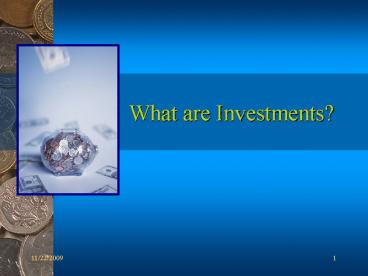What are Investments - PowerPoint PPT Presentation
1 / 15
Title:
What are Investments
Description:
2. Compound. 11/2/09. 4. Simple Interest ... Calculation. Interest Rate. Principal. Year ... years it will take to double your money based on compound interest: ... – PowerPoint PPT presentation
Number of Views:33
Avg rating:3.0/5.0
Title: What are Investments
1
What are Investments?
2
Investments
- An Investment means putting your money to work
for you. - By investing your money, you are hoping that your
money will make money.
3
Interest is the Key ?
- Interest is the amount of money paid for the use
of money. - When we have a loan at the bank, we pay the
interest to the bank for using their money. - When we invest, we receive interest for lending
our money. - There are two types of interest
- 1. Simple
- 2. Compound
4
Simple Interest
- Simple Interest is when the amount of money
gained depends only on the original amount
(principal) invested.
In this example, the Total Interest earned is
350 in 5 years. After 20 years, the interest
earned would be 1,400.
5
Compound Interest
- Compound Interest is when the amount of money
gained is calculated on the original principal
plus the previous years interest
In this example, the Total Interest earned is
402.55 in 5 years. After 20 years, the interest
earned would be 2,869.68 WOW!
6
Rule of 72
- The Rule of 72 is a simple way to find out how
many years it will take to double your money
based on compound interest
72
Years to double your investment Interest Rate
7
Risk / Reward Trade Off
- Generally, the higher the potential there is to
lose your money (risk), the higher the potential
there is to make a larger amount of money
(reward). For example the Stock Market - Similarly, usually if you invest your money in
something with very low risk, the ability to make
money tends to decrease. For example a savings
account
8
Lender versus Owner Investors
- Generally, when you invest your money, you are
either - lending your money for others to use, such as a
government bond - or you are
- purchasing part of a company, such as a stock
9
Types of InvestmentsSavings Account
- The average interest rate is fairly low.
- You can access your money very easily in person
or through an ATM at any time these services are
available.
10
Types of InvestmentsTerm Deposit
- An investment that is for usually less than one
year. - A lender investment.
- Pays a fixed amount of interest for a fixed
amount of money, for a fixed period of time. For
example, you may need to invest 100, knowing
that at the end of 5 months you will have earned
20. - There is normally very little risk.
- No fees are charged.
- Interest rates are higher than with savings
accounts. - Your money is locked in for a fixed amount of
time. - There is a penalty to withdraw your money before
the end of the term, and sometimes the penalty
will cost more than what could be made in
interest.
11
Types of InvestmentsGIC
- Guaranteed Investment Certificate
- A lender investment
- An investment that is usually for more than one
year. - Pays a fixed amount of interest for a fixed
amount of money, for a fixed period of time. For
example, you may need to invest 1000, knowing
that at the end of 16 months you will have earned
250. - Normally requires a larger minimum deposit than
for a term deposit. - There is normally very little risk.
- No fees are charged.
- Interest rates are higher than with savings
accounts and term deposits. - Your money is locked in for a fixed amount of
time. - There is a penalty to withdraw your money before
the end of the term, and sometimes the penalty
will cost more than what could be made in
interest
12
Types of Investments Bonds
- A lender investment, lending money to the
government or corporations. - The pay a fixed interest rate for a fixed period
of time. When the period of time is up, the bond
is said to have matured. - There is some risk, depending on the type of bond
being purchased. - Canada Savings Bond the safest investment,
backed by the Government of Canada - Corporate is sold by a private company to raise
money. If the company goes bankrupt, bondholders
have first dibs on the property of the company.
13
Types of Investments Stocks
- An owner investment
- By purchasing a stock, you own part of the
company youve invested in. - You will gain money through their profits (the
amount of money the company will make). These
are called Dividends, which are company earnings
split up between the shareholders. - This can involved a high level of risk.
14
Types of InvestmentsMutual Funds
- Both a lender and owner investments.
- Money from many people is pooled together.
- This gives an investor more to work with and the
ability to purchase investments that would be
difficult for one person to purchase as they can
be very pricy. - These investments can be a combination of stocks,
bonds and other investments. These create what
is known as a portfolio.
15
The End
- Happy investing )































